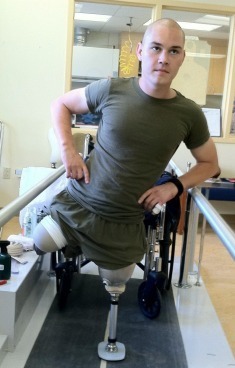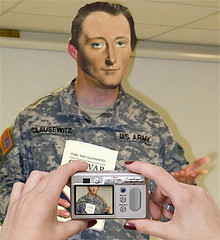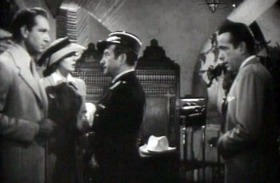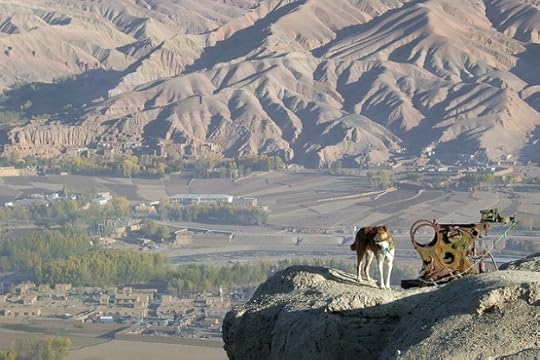Thomas E. Ricks's Blog, page 230
September 26, 2011
Who succeeds in COIN work? It ain't always them sophisticated smoothies

There's a line in David Kilcullen's
"28 Articles" about
how you'd be surprised which soldiers are able to do counterinsurgency or
similar work, and, he adds, it has nothing to do with rank or even with
education. I thought of that when I read this observation by Maj.
Jason Ross, an Army intelligence officer, about his time in 2006 as a
member of an officer-heavy advisory team with the Iraqi army in Baghdad:
We had a lot of intelligent folks
on our team like pilots and people with advanced degrees but we had a staff
sergeant from the backwoods of Kentucky who was probably the most successful
member of the team. He somehow related to the Iraqi soldiers and latched on to
one or two of their non-commissioned officers and he got the most done.
A legless soldier's request: Look at me!

"I would want people to treat us as
they treat themselves. Not look down on us because we're injured," Artem
Lazukin tells
the Oregonian's Mike Francis. "When I've been around people, I've seen
them look away. Like I'm not there."
More heat injuries at Fort Bragg

Like we
were saying. Thirteen soldiers hospitalized, one in intensive care.
What up with that?
(HT to EL)
Auftrag-static (V): Mission command without educated officers is just foolish

This fifth column on Auftragstaktik
is in fact our third from Germany, which is fitting.
I think I disagree with the argument
offered below, because I think Moltke codified the theory but that it was
entirely possible to have mission command before he did that. I suspect what
you need is competent, cohesive units with profound trust running both ways in
the chain of command. But I still think this column is worth reading, if you
are trying to understand this important subject.
By Stefan Schilling
Best Defense department of Auftragstaktik
affairs
I believe both Maj.
Smith's and Col. Yingling's
arguments to be both true and false. It becomes apparent when reading both
articles that both do debate Auftragstaktik,
but do so from different perspectives and lack a common understanding of what
is meant by the phrase "mission command."
Paul Yingling certainly is right in claiming that mission command works better
with senior officers who possess traits such as courage and intelligence. Yet,
I bet pretty much every organization works better when intelligence is
involved.
While his claims that Scipio and Hannibal have applied Auftragstaktik simply
because they were courageous and intelligent does neglect the fact that Auftragstaktik
is based on a vast and deep understanding of theory. He is also wrong about
Guderian's officers. As Col. Yingling has argued, "these officers succeed
because they had the intelligence to see the battlefield clearly, and the
courage to act on their convictions." As Clausewitz has taught us, no
officer or leader has the intelligence or the ability to see anything in war
clearly, not in our current wars and not in the times of Moltke or Scharnhorst.
But what set the officers of Guderian apart from Scipio's, Patton's and Hanibal's
was their ability, installed by rigorous education and training, to accept the
friction of war and use it to their advantage by exploiting the enemy's weak
points when they became apparent. This is what mission command is about.
Most of the historical figures Paul Yingling cites were undoubtedly great commanders with a deep insight into the friction and intricacies of war, and were certainly not afraid of bureaucracies or higher echelons. Yet
they did not necessarily command in a mission command style just because they
were courageous and able to exploit weaknesses. Auftragstaktik is
not about one great commander, but about ensuring that every commander has the
ability to trust in every junior officers to perform in his intent and exploit
chances when they present themselves. [[BREAK]]
As Eitan Shamir has so vividly shown in his book Transforming
Command
- The Pursuit of Mission Command in the U.S., British and Israeli Armies,
militaries tend, when confronted with new cultures, to look to their past in an
attempt to proof that the "new" is actually a well-known tradition of
their respective forces. In the British army this was attempted by identifying
the command styles of Oliver Cromwell, Wellington and the Duke of Marlborough
as mission command. The narrative in the U.S., according to Shamir, is that
commanders such as Sheridan or Patton are identified as having commanded in
such a way. In the Israeli case, he argues, the Palmach have been the tradition
with which to prove that mission command has been a long-lasting tradition
within the IDF. However, in each of the cases we might talk about courageous
and intelligent commanders, but they were not backed up by the tenets of mission command. For example, while the early IDF as well as the Palmach
had a great tradition of practicing and exploiting the enemy's weaknesses, they
were utterly opposed to general staffs and leadership education, which
subsequently lead to a gradual disappearance of mission command.
Yet, Auftragstaktik's
major tenet is (and its lack is what I believe Maj. Smith is rightly lamenting)
the ability of every junior officer to be able to understand his immediate
superior officer's job and if need be to command in place of that superior.
This has the advantage and the consequence that every junior officer
understands perfectly - and performs according to - the intent of his superior
officers. (Not according to his will but his intent.) This is, I believe, the
core of mission command. Moltke, the father and implementer of mission command, has set
up the Kriegsakademie to teach and educate junior officers to do exactly
this, by consistent war gaming and simulating. War games, as Maj. Smith has
remarked, have the ability to put everyone on the same page and assure that no
system is left out. However, in order to assure this, officers need experience.
This was assured in Prussia by sending the graduates of the Kriegsakademie
to spent six months in a branch other than their own, and then on to serve on
the general staff for a one-year trial period. Guderian's officers were not
only courageous but were also made aware by having been educated in mission
command in the style of Moltke's Kriegsakademie. As such, they
undoubtedly did have their share of education, training and hands on experience
in general staffs before assuming command that Col. Yingling claims not to be
necessary.
If, however, promotions are made as Maj. Smith has pointed out, in a hurricane of personnel moves, without either the education or the hands-on expertise in staff, this experience is certainly missing from the force and the
education process and the trial period assured that every officer has the
common knowledge base, and a common language and understanding of issues. Maj.
Smith thus is not wrong about Auftragstaktik as Paul Yingling claims,
but points out the central tenet of Auftragstaktik as well as the
dangers when mission command is applied without the education it necessitates.
However, our discussions seem to show several problems consistent in many
militaries and certainly the U.S. Army.
1. mission
command is not universally understood, and many different versions of its
meaning seem to be floating around.
2. The
U.S. Army has not implemented mission command as it should be otherwise this
discussion would not arise.
3. Well-meant
programs such as ARFORGEN are not well suited to prepare officers for their
capabilities on the ground.
4. Modern
battleground tools such as drones, BFT's and so on are only increasing the
ability of senior commanders to micromanage, but not their ability to apply
mission command.
It is needless to say that suspected
disability of junior officers might serve
as an excuse for poor command, these difficulties do force commanders
often enough to rely on "Befehlstaktik,"simply
because they cannot trust in their junior officers' ability to understand and
execute in their intent.
To change this, Col. Yingling is certainly right in saying that: "Senior
officers who wish to exercise mission command shouldn't wait for favorable conditions; they should create them." But this also involves creating the educational system for junior officers to train, practice
and gain experience in order to come up with unique and desirable ideas.
Stefan Schilling is an academic
assistant at the Department for International
Relations and Foreign Policy of the University of Heidelberg, Germany. He has
earned a M.A. in Political Science from the University of Heidelberg and is
currently working on a doctoral thesis on U.S. military organization and
innovation.
September 23, 2011
U. of Texas prof: Keep these crazy vets and ROTC cadets away from me!

A history professor at the University
of Texas at Arlington candidly
discusses why she no longer wants to teach military history. Basically,
there are too many vets and ROTC cadets in the class, and they take this stuff
too personally. By her account, they are waaaay too into the subject,
and kind of nuts:
Some students admitted privately that
they themselves were suffering from PTSD, but for various reasons had rejected
available help. As we approached the anniversary of the Oklahoma City bombing,
a retired Air Force officer asked permission to recount his experiences
searching for bodies in the rubble because he had been advised that it would
help with his post-trauma disorder.
One student, a veteran, explained
that he had been deployed six times and was now at the university in order to
attend aviation school and thus avoid another deployment. Another student, one
of several who seemed to be suffering from anxiety, frequently talked of all
the guns he had purchased since he had returned. One had just returned home in
December and had immediately begun classes in January, but confessed he simply
could not relate to other students. Two dropped out because of combat wounds
that required attention.
Enlisted veterans spoke disparagingly
of officers commissioned through ROTC; veterans who had been commissioned
through ROTC spoke disparagingly of military-academy graduates;
"lifers" made clear that they, alone, could really understand
military-history issues; veterans of one branch of military service made
derogatory comments about members of other branches-and not in a teasing way.
There was a noticeable edge to their class contributions that wasn't present in
my other classes.
What these students needed was
personal catharsis, but I am not a trained psychologist. What these students
craved was the opportunity to express their anger or pain, but my class was not
the place to do it.
Tom again: I think it would be fun to
teach a class of really engaged, committed students for whom the subject matter
carried life-and-death importance. Sure, you'd get some "edge." Just like we do
in our comments section, from which. I learn a lot.
(HT to Scout)
Adm. Mullen accuses Pakistan's ISI of treachery, but says let's keep talking

I wonder which
step Mullen is on?
The chairman of the Joint Chiefs
of Staff said to the Senate Armed Services Committee yesterday that Pakistan's
intelligence agency was in the background of the recent attack on our embassy,
as well as a bunch of other assaults. But he seems happy to keep on chatting
with them.
He also said a bunch of other
stuff, like about where the fight is. My interpretation is that we have moved
to a strictly transactional relationship. We will continue to deal with them
but will call them out on occasion.
Just treat this as a guest column.
With ISI
support, Haqqani operatives plan and conducted that truck bomb attack, as well
as the assault on our embassy. We also have credible intelligence that they
were behind the June 28th attack on the Inter- Continental Hotel in Kabul and a
host of other smaller but effective operations.
In choosing
to use violent extremism as an instrument of policy, the government of
Pakistan, and most especially the Pakistani army and ISI, jeopardizes not only
the prospect of our strategic partnership but Pakistan's opportunity to be a
respected nation with legitimate regional influence. They may believe that by
using these proxies, they are hedging their bets or redressing what they feel
is an imbalance in regional power. But in reality, they have already lost that
bet. By exporting violence, they've eroded their internal security and their
position in the region. They have undermined their international credibility
and threatened their economic well-being. Only a decision to break with this
policy can pave the road to a positive future for Pakistan.
... As you know, I've expended enormous energy on this relationship. I've
met with General Kayani more than two dozen times, including a two and a half
hour meeting last weekend in Spain ... Some may argue I've wasted my time, that
Pakistan is no closer to us than before, and may now have drifted even further
away. I disagree. Military cooperation again is warming. Information flow
between us and across the border is quickening. Transparent -- transparency is
returning slowly.
... I
actually believe that the ISI has got to fundamentally shift its strategic focus.
They're -- they are the ones who implement as -- I would argue as a part of
government policy the support of extremists. It's not just Haqqani because we've
also had our challenges with LET, which is an organization they put in place. So
in many ways, it's the proxy piece here. The support of terrorism is part of
their national strategy to protect their own vital interests because of where
they live. And that's got to fundamentally shift.
... it's very
clear the toughest fight is going to be in the east, and the Haqqani network is
embedded in Pakistan essentially across from hosts Paktia and Paktika, which,
as General Petraeus said, is sort of the "jet stream to Kabul." And
they want to own that. That's really their goal ... So I think the risk there is
very high. Over the course of the next couple of years I think the biggest
fight is going to be in the east, enabled certainly by us, but also Afghan
security forces and coalition forces, more than anyplace else. The south I'm
not going to say is not problematic, but we're in a much better place in
Kandahar and Helmand than we were a couple years ago. It's going to be the
east, I think, that in the end answers this from a security standpoint. And
Haqqani is at the heart of that.
Pakistani defense minister: No gambling going on in this casino

Pakistan's defense minister utterly
rejects American allegations that his government is playing footsie with
the Haqqani network. If the U.S. government has such information, it should
pass it on, he says with some indignation.
Meanwhile, a little
grasshopper/ant writes to ask if there is anything he can read to understand
why Pakistan feels so threatened by India. "i'm a naive westerner and can't figure out why pakistan anticipates that india would want to invade - what does it have of value that india might wish to dispossess it of ? i understand the rudiments of the kashmir conflict and a disputed border, but i'm having trouble extrapolating that to existential threat levels."
Anyone got a good suggestion?
Tom's War Dog of the Week: A pup watching over Bamiyan, Afghanistan

Rebecca appears to
be on strike, so Tom's war dog of the week (until we can get Rebecca to
re-surface) is a dog in Bamiyan, one of my favorite towns in Afghanistan. When
I ran my junior class trip there in 1970 we picnicked atop the flat head of one
of the Buddha statues.
September 22, 2011
10 truths from the last decade that you could tattoo on an arm -- or maybe a leg

Lt. Col. Don Theime rightly pointed out in the August issue
of Marine
Corps Gazette that the same old lessons keep on getting repeated in our
discussions of the current wars. Here is his summary of the "10 truths" that
simply need to be heeded:
--Take the high ground at night so you own it in the
morning.
--It may be counterintuitive, but you are probably safer
dismounted than in your vehicles, preferably before contact.
--The bait and ambush is a classic from the ancient Greeks
up to today.
--Why do we keep using the column formation in what is
clearly an advance to contact, rather than using wedges and echelons?
--Every Marine a rifleman, and every NCO a leader and fire
support coordinator.
--These are seasoned fighters with a wealth of experience
fighting against Jomini-type tactics and a sense of personal honor and bravery
that means they are looking to close and kill, not snipe and run.
--If you are not using Small Wars Journal and Company Command, you should be.
--Afghanistan is a battle for the provision of governance
from the ground up, from the outside in, not from the top down, Kabul out.
--The Taliban, while at some level perhaps associated with
al Qaeda, is not al Qaeda.
--Is this the right war?
How the Bush-Cheney years changed Andrew Sullivan's view of America

This is harsh, but I think he captures
it well. I never thought I would be a citizen of a country that endorsed
torture. It still makes me sad to think about that.
I will never think of America the same way after the
Bush-Cheney administration. They ripped the scales off my eyes; they proved
that America isn't, in the end, different; that its core moral principles, such
as the prohibition of torture, are nostrums to be tossed aside at the whim of a
few very scared and incompetent men; that the rule of law ends when it comes to
presidential power, when he can simply order dipshit lawyers to say black is
white; when no regret is ever truly expressed about the tens of thousands of
Iraqis who died under US occupation; when the architects of these strategic and
moral disasters are given legal immunity and peddle books on talkshows
defending and bragging of their own awful legacy.
Thomas E. Ricks's Blog
- Thomas E. Ricks's profile
- 436 followers



